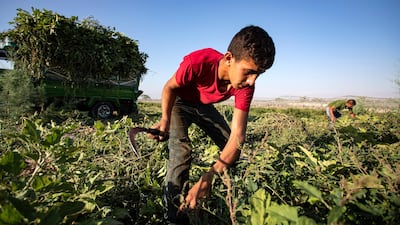The European Union’s top diplomat on Thursday promised to help Jordan cope with new economic pressures since the war in Ukraine, but said that Russia is responsible for creating them.
“Putin is responsible for aggravating the food and energy crisis,” said Josep Borrell, High Representative of the European Union for Foreign Affairs, referring to the Russian president.
“But we are ready to help Jordan face the negative consequences, especially on food prices,” he said after meeting Jordan's King Abdullah in Amman.
Jordan, which depends on western aid, has refrained from criticising the Russian invasion of Ukraine, which entered its 99th day on Thursday. The kingdom deepened its security ties with Russia and supported Moscow's 2015 intervention in Syria in support of President Bashar Al Assad.
The kingdom receives €364 million ($390.2m) of EU aid every year and hundreds of millions more from individual European countries, mainly Germany and France, on top of $1.6 billion in US aid.
Oliver Varhelyi, another senior EU official accompanying Mr Borrell on his Jordan trip, announced that the bloc will be giving Jordan an additional €24 million in the next few days to deal with rising living costs.
Foreign investment and economic growth have been stagnant for years and in the past three months prices of most basic goods rose sharply, although there have been no significant shortages. Unemployment is officially at a record high of about 24 per cent.
Mr Borrell blamed the Russian president for triggering a global food crisis, which he described as the “third horse of the apocalypse" and which he said has hit the Middle East especially hard.
He said Russia's blockade of Ukrainian ports and its destruction of silos and agricultural fields slashed Ukrainian wheat exports to 600,000 tonnes last month, compared to five million tonnes of monthly exports before the invasion.
Mr Borrell said the EU is also helping Jordan “with the consequences of other conflicts, similarly aggravated by Russian military actions”.
“I am talking about Syria,” he said. “We commend and appreciate Jordan’s generosity in hosting Syrian refugees. We will continue to support you in this context."
About 700,000 Syrians fled to Jordan in the past decade and are registered with the United Nations as refugees.
Jordanian officials say the Russian intervention has contributed to stability in Syria, a position not shared by Jordan's western donors.
Mr Borrel said he discussed with Jordanian officials "democratic principles, fundamental freedoms and human rights" in the kingdom.
“Freedom, human rights and democracy are the cornerstone of the European union,” he said. “We want it to be also the cornerstone of our partnership with Jordan.”











